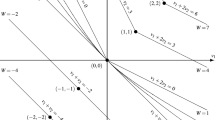Abstract
In the line opened by Kalai and Muller (J Econ Theory 16:457–469, 1977), we explore new conditions on preference domains which make it possible to avoid Arrow’s impossibility result. In our main theorem, we provide a complete characterization of the domains admitting nondictatorial Arrovian social welfare functions with ties (i.e. including indifference in the range) by introducing a notion of strict decomposability. In the proof, we use integer programming tools, following an approach first applied to social choice theory by Sethuraman et al. (Math Oper Res 28:309–326, 2003; J Econ Theory 128:232–254, 2006). In order to obtain a representation of Arrovian social welfare functions whose range can include indifference, we generalize Sethuraman et al.’s work and specify integer programs in which variables are allowed to assume values in the set \(\{0, \frac{1} {2},1\}\): indeed, we show that there exists a one-to-one correspondence between the solutions of an integer program defined on this set and the set of all Arrovian social welfare functions—without restrictions on the range.
Access this chapter
Tax calculation will be finalised at checkout
Purchases are for personal use only
Similar content being viewed by others
Notes
- 1.
Maskin [4] independently investigated the same issue.
- 2.
We have to stress that we still apply the basic tools of integer linear programming and that the programs we introduce could be equivalently defined on the set {0, 1, 2}. Nonetheless, here we prefer to follow Sethuraman et al. [6], and keep using the value \(\frac{1} {2}\) in order to incorporate indifference between social alternatives into the analysis.
- 3.
In building IP2, we take inspiration from a binary IP on \(\Omega\), introduced by Sethuraman et al. [5], which incorporates a reformulation of Kalai and Muller’s condition of decomposability. It can be shown that the set of constraints proposed by Sethuraman et al. exhibits problems of logical dependence (see Busetto and Codognato [2]), which are eliminated in our IP2. These problems parallel some logical redundancies inherent in Kalai and Muller’s notion of decomposability, which we will point out in Sect. 4.
References
Arrow KJ (1963) Social choice and individual values. Wiley, New York
Busetto F, Codognato G (2010) Nondictatorial Arrovian social welfare functions and integer programs. Working Paper n. 01-10-eco, Dipartimento di Scienze Economiche, Università degli Studi di Udine
Kalai E, Muller E (1977) Characterization of domains admitting nondictatorial social welfare functions and nonmanipulable voting procedures. J Econ Theory 16:457–469
Maskin E (1979) Fonctions de préférence collective définies sur des domaines de préférence individuelle soumis à des constraintes. Cahiers du Séminaire d’Econométrie 20:153–182
Sethuraman J, Teo CP, Vohra RV (2003) Integer programming and Arrovian social welfare functions. Math Oper Res 28:309–326
Sethuraman J, Teo CP, Vohra RV (2006) Anonymous monotonic social welfare functions. J Econ Theory 128:232–254
Acknowledgements
This paper has been written to honor Nick Baigent and his distinguished contributions to social choice theory. We would like to thank an anonymous referee for his comments and suggestions. Francesca Busetto and Giulio Codognato gratefully acknowledge financial support from MIUR (PRIN 20103S5RN3).
Author information
Authors and Affiliations
Corresponding author
Editor information
Editors and Affiliations
Rights and permissions
Copyright information
© 2015 Springer-Verlag Berlin Heidelberg
About this chapter
Cite this chapter
Busetto, F., Codognato, G., Tonin, S. (2015). Nondictatorial Arrovian Social Welfare Functions: An Integer Programming Approach. In: Binder, C., Codognato, G., Teschl, M., Xu, Y. (eds) Individual and Collective Choice and Social Welfare. Studies in Choice and Welfare. Springer, Berlin, Heidelberg. https://doi.org/10.1007/978-3-662-46439-7_10
Download citation
DOI: https://doi.org/10.1007/978-3-662-46439-7_10
Publisher Name: Springer, Berlin, Heidelberg
Print ISBN: 978-3-662-46438-0
Online ISBN: 978-3-662-46439-7
eBook Packages: Business and EconomicsEconomics and Finance (R0)




